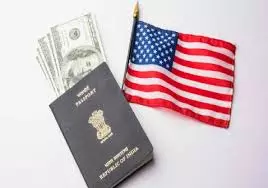Social Media Vetting Must For US Student Visa Applicants
This development follows reports last month indicating that the US government has begun implementing stricter procedures for social media vetting and applicant screening. A

New Delhi:In a big move, the United States Embassy in New Delhi on Monday issued a directive requiring increased scrutiny of social media activity of applicants seeking non-immigrant visas to the US. The embassy stated, "Effective immediately, all individuals applying for an F, M, or J non-immigrant visa are requested to adjust the privacy settings on all of their social media accounts to public, to facilitate vetting necessary to establish their identity and admissibility to the United States under US law."
This development follows reports last month indicating that the US government has begun implementing stricter procedures for social media vetting and applicant screening. According to American media reports, a diplomatic cable from US Secretary of State Marco Rubio had stated: “Effective immediately, in preparation for an expansion of required social media screening and vetting, consular sections should not add any additional student or exchange visitor (F, M, and J) visa appointment capacity until further guidance is issued.”
The new guidelines come amid a wider crackdown on foreign students in the US, with several student visas reportedly revoked over alleged participation in protests and expressed support for radical Palestinian groups, including Hamas. The Trump administration is reportedly pushing for enhanced pre-visa scrutiny of political views and online activity as a way to determine applicant suitability.
India, in response to these developments last month, expressed hope that the United States would assess visa applications of Indian students based on merit to ensure they can join their academic programs on time. Addressing media at the time, MEA Spokesperson Randhir Jaiswal acknowledged the media reports regarding the updated US guidelines and emphasised that the interests of Indian students are of paramount concern to the Indian government. He also noted, however, that visa issuance is a sovereign function of any nation. According to Jaiswal, approximately 3.3 lakh Indian students were granted US visas for the 2023–24 academic year.
In a related advisory issued a few weeks ago, the U.S. Embassy in New Delhi warned Indian students studying in the US, or aspiring to study there, that dropping out, skipping classes, or leaving their academic programs without notifying their institutions could lead to visa revocation and ineligibility for future US visas. The embassy stated: “If you drop out, skip classes, or leave your program of study without informing your school, your student visa may be revoked, and you may lose eligibility for future US visas. Always adhere to the terms of your visa and maintain your student status to avoid any issues.”
In a further warning last week, the U.S. mission cautioned that foreign nationals overstaying their visas could face deportation and a permanent travel ban. “If you remain in the United States beyond your authorised period of stay, you could be deported and could face a permanent ban on traveling to the United States in the future,” the advisory read.
India had earlier reiterated that visa policies fall within the sovereign rights of a nation, stating, “We expect foreign nationals to abide by our rules. Similarly, Indian nationals abroad must also comply with local rules and regulations.”
